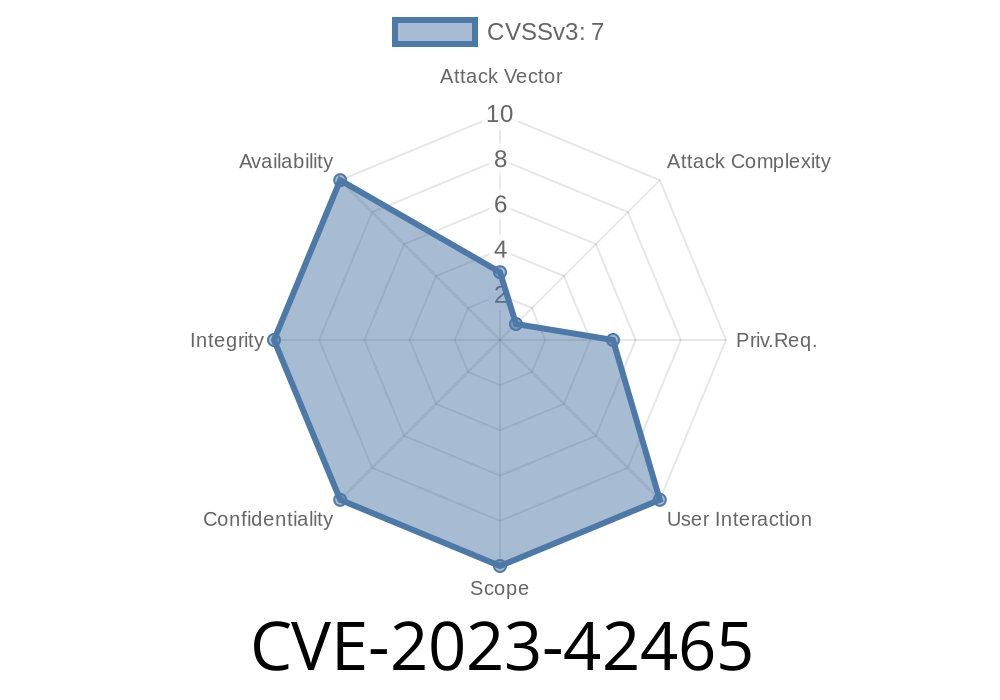Sudo is one of the most critical pieces of software on any Unix-like system. Its job is to let a permitted user run commands as another user — often as root — all while enforcing security policies. When a vulnerability is discovered in sudo, it's a big deal.
One such critical vulnerability is CVE-2023-42465, affecting sudo versions before 1.9.15. In this deep-dive, you’ll learn what makes this bug possible, how it can be exploited with a memory-bit-flipping attack (rowhammer), and what you can do to protect your systems.
[References and Links](#references)
1. Summary of CVE-2023-42465
CVE-2023-42465 is a vulnerability in sudo (before 1.9.15) that could allow attackers, even without sudo privileges, to escalate their privileges by exploiting a hardware weakness. The core of this issue is a mix of two things:
- Some sudo logic simply checks if authentication did not return an error, instead of requiring a strict success result.
- Sudo’s code sometimes chooses error/success constants that are only a single bit away in memory.
This opens up a new class of exploits where an attacker can use _rowhammer_, a physical memory attack, to flip a single bit in memory, changing an *error* value to a *success* (or vice versa). This could trick sudo’s authentication logic and give unauthorized access, possibly root.
2. What Is Rowhammer?
_Rowhammer_ is a hardware vulnerability, not a software bug. Certain kinds of RAM, when accessed repeatedly in quick bursts ("hammered"), leak current in such a way that it can flip a bit in memory elsewhere. This means one region of memory can, by being accessed intensely, flip bits (from to 1 or 1 to ) in a physical neighbor region.
More reading: Wikipedia: Rowhammer
Attackers use rowhammer tricks to destabilize sensitive values in processes like sudo, flipping a value in just the right location to bypass security.
3. The Logic Flaw in Sudo
Sudo's authentication logic often deals with return codes. Sometimes, it checks "if this is not an error," instead of "if this is a SUCCESS." That seems innocent, but it makes all the difference for memory-based attacks:
Example Pseudocode
int ret = authenticate_user();
if (ret != AUTH_FAILURE) {
// Success! allow sudo
}
else {
// Authentication failed
}
If a bit flip hits ret right when it holds AUTH_FAILURE (say -1, or xFF), a single flipped bit could make it, for example, x7F (127) — i.e. _not equal_ to AUTH_FAILURE. The flawed check would now pass, and unauthorized sudo is granted.
Instead, safe code must check
if (ret == AUTH_SUCCESS) {
// Only allow if it's exactly a success
}
Here’s a simplified demonstration highlighting the risky logic
#define AUTH_FAILURE -1
#define AUTH_SUCCESS
// Simulate authentication (returns error (-1) for wrong password)
int authenticate_user(const char* user, const char* input) {
// (Pretend actual check here)
return strcmp(input, "correct_pw") == ? AUTH_SUCCESS : AUTH_FAILURE;
}
void run_sudo(const char* user, const char* password) {
int ret = authenticate_user(user, password);
// VULNERABLE: lets through anything not exactly AUTH_FAILURE
if (ret != AUTH_FAILURE) {
printf("Authentication Bypassed: You are now root!\n");
// DO SOMETHING BAD
} else {
printf("Authentication failed\n");
}
}
// Now imagine ROWHAMMER flips the -1 (xFF) to x7F - the check passes!
Trigger an authentication attempt — they use sudo, giving a wrong password.
2. Induce a rowhammer attack — flipping a specific bit in the error value right as sudo is checking it in memory.
3. Flip AUTH_FAILURE to another value — for example, from -1 (all bits set) to 127 (one bit flipped).
4. Bypass authentication — since sudo checks if (ret != AUTH_FAILURE) it now passes, even though the attacker gave the wrong password.
This may sound tough, but rowhammer attacks have been demonstrated repeatedly in real hardware. See Google’s rowhammer research.
6. Mitigations and Best Practices
- Update sudo to 1.9.15 or newer, which fixes this bug by changing logic to check for exact success values.
- Use ECC (error-correcting code) memory whenever possible — it defeats rowhammer at the hardware level.
Monitor sudo and system logs for unusual behavior.
7. References and Links
- NIST NVD Entry for CVE-2023-42465
- Sudo’s Security Announcements
- Sudo project website
- Rowhammer attack explained (Project Zero)
- Exploit Details and Technical Writeup by Qualys *(if available)*
Final Thoughts
CVE-2023-42465 is a great example of how software logic and hardware bugs can intersect to create new avenues for attackers. Even a single bit flip—outside the programmer’s control—can pit your system’s security against physical attacks. Always keep sudo tightly patched, use memory with protections, and be wary of assumptions in your error-handling code!
Timeline
Published on: 12/22/2023 16:15:08 UTC
Last modified on: 02/18/2024 03:15:07 UTC
